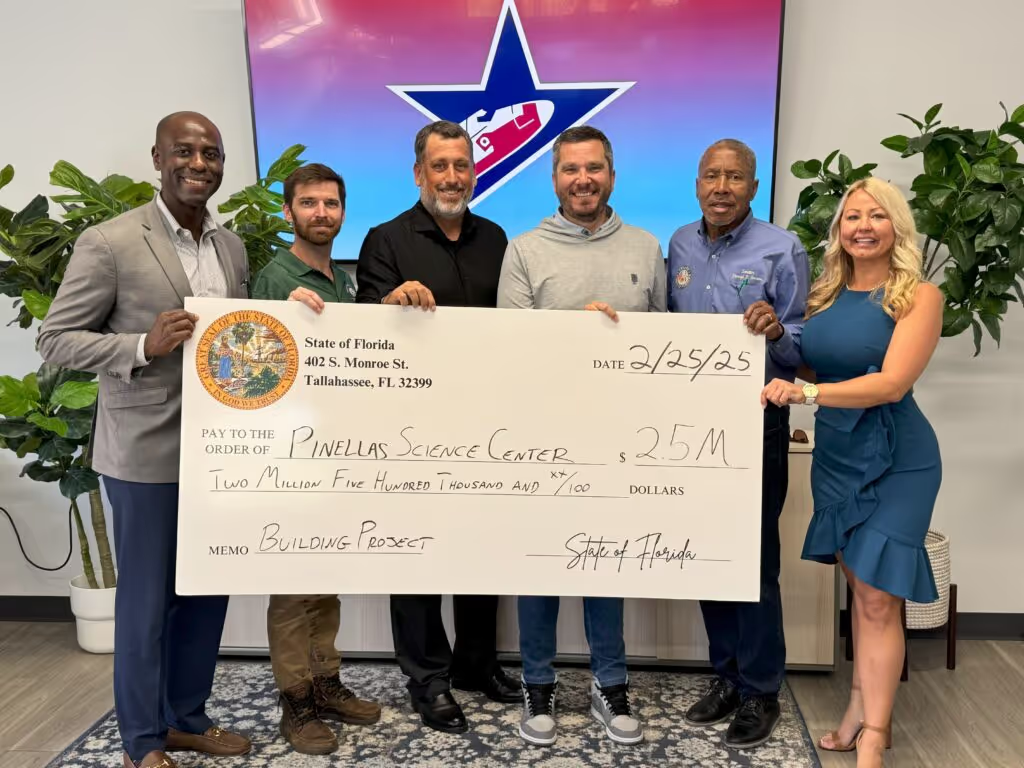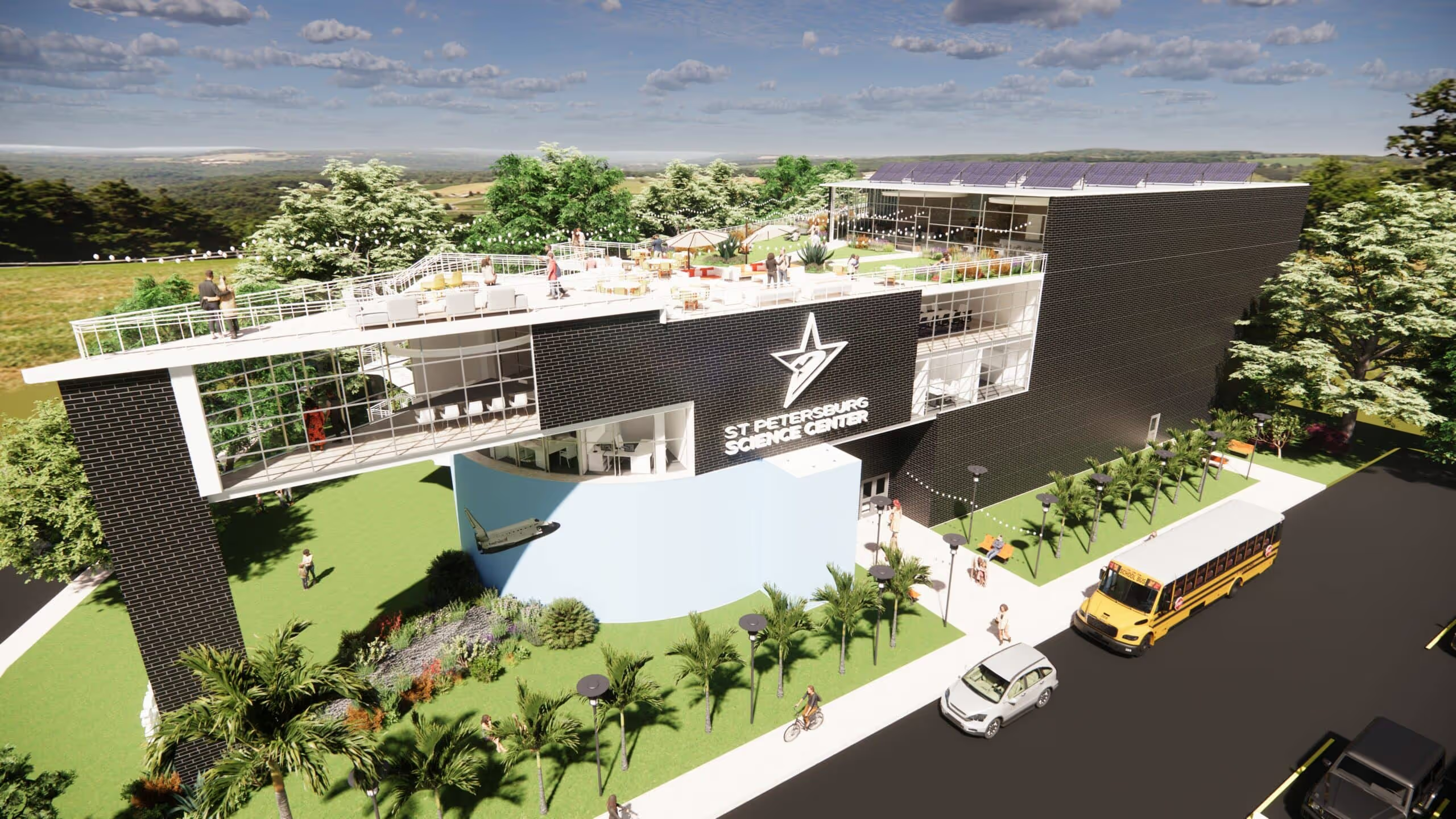
CONTENT

.avif)

Funding, plans are solidifying for the ‘new’ Science Center
Funding, plans are solidifying for the ‘new’ Science Center
The resurrection and revitalization of St. Petersburg’s Science Center (1966-2019) came that much closer to reality Tuesday, as Florida legislators handed the education center’s prospective new proprietor a state-signed check for $2.5 million.
It was one-tenth of the projected cost for the reimagined facility, nestled on 3.9 acres in western St. Pete’s Azalea neighborhood, but it upped the collected total to $9 million. And there’s more in the pipeline, which to organizers and supporters means the $25 million project is really going to come to fruition.
“It feels like we’re almost there, that we’re on the precipice,” said Sen. Darryl Rouson (D-St. Petersburg), who was instrumental in getting the $2.5 million appropriation pushed through. “And that’s exciting, thinking about the number of children, teenagers and young adults that will come to this facility and be sparked with imagination and knowledge that they’ll carry for a lifetime.”
Rep. Berny Jaques (R-Seminole) worked with Rouson on securing the funding. “We’re investing in our youth, in such an important academic subject: Science,” Jaques said. “Not just science in general, but technology, engineering, mathematics. These are the jobs of today and tomorrow.
“We want these kids to be equipped early on so they can be more marketable as they make their way through school – to be able to hit the ground running and support themselves and their families.”
READ MORE: Vintage St. Pete: The Science Center (Parts 1, 2 and 3)
Working in tandem with private and public schools, the Science Center provided classrooms and laboratories for young people (thousands of them each year) to learn, research and experiment. And have fun. It housed a library, a small planetarium, animal exhibits, an observatory, climate study tools and, in later years, a computer lab (one of the first in Pinellas County).
The City bought the property, and the building, in 2019.
Joe Hamilton, co-founder of the St. Petersburg Group, a capacity building organization (he’s also the publisher of the St. Pete Catalyst) and board member of the nonprofit St. Petersburg Foundation, is leading the reimagination of the facility. The focus, he said, will be on emerging technologies, with a special emphasis on artificial intelligence (AI).
“The right people, the right experts, will help build out the curriculum,” Hamilton said. “and the facility will be an AI resource for not just students, but corporations, nonprofits, government and the community at large. When someone thinks AI, we want this facility to be top of mind.”
Former Pinellas County Schools superintendent Julie Mastry is overseeing the educational component and staff hires. Private schools, charter schools and other educational organizations have already expressed major interest.
Students will be bussed to and from the Science Center. The year-round schedule will also include summer camps and day camps.
“Additionally,” Hamilton explained, “we’re creating a fertile environment for others, a docking station, to attract AI talent, investment and companies to plug in to.
“We see this as an economic development tool. Whenever transformative technologies emerge, it shakes up the leaderboard for cities and regions. This facility is as a way for our community to capitalize on the opportunity AI presents and jump up the leaderboard.”
The new project is more than a shiny new phoenix rising from the ashes of the old-school Science Center. Most of the original building will be demolished, and rebuilt as a four-story, 50,000-square-foot triangle. Hamilton’s plans include, along with classrooms and top-of-the-line equipment, a high-tech auditorium made for hybrid events – called the Hybritorium – and an “AI Village” for students with 12 stations, 11 of them focusing on a different application or interpretation of artificial intelligence (data, ethics, health, environment et cetera).
One station will be a “throwback” to science projects and experiments of earlier times.
Two partners are already onboard. Pathfinder Outdoor Education and Water Warrior Alliance will operate stations in the AI Village.
The classroom sections will be secure, while the cylindrical part of the building – the only segment to be retained from the 1966 Science Center – will include a café, access to the revitalized backyard gardens (including the colorful, circa-1970 tile mosaic trail, depicting all 50 states and interesting facts about each) and the planetarium. Events will be held in the rooftop Star Garden.
That’s so visitors – locals and tourists alike – can enjoy the facility, completely separate from the educational component.
Also planned is nearly 15,000 square feet of leasable high-tech office space.
With a 2026 opening penciled in, the Science Center will operate as a public/private partnership with St Petersburg Foundation managing most of the facility, and the St. Petersburg Group operating the office space.
“I’m trying to provide the maximum value I can to the region and the community,” Hamilton explained. “We must honor the past, prepare for the future and do so within a sustainable business model, so this incredible resource can serve our region for generations to come.”













